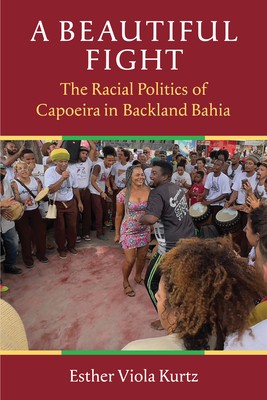
- We will send in 10–14 business days.
- Author: Esther Viola Kurtz
- Publisher: University of Michigan Press
- ISBN-10: 0472057545
- ISBN-13: 9780472057542
- Format: 15.2 x 22.6 x 1.5 cm, minkšti viršeliai
- Language: English
- SAVE -10% with code: EXTRA
Reviews
Description
A Beautiful Fight examines the potentials and limits of capoeira Angola to cohere a multiracial community committed to antiracist struggle. Capoeira, a musical fight-game that originated among enslaved Africans in Brazil, holds special significance for Black Brazilian activists as a spiritual and political practice that affirms the value of Black lives, thus countering anti-Black violence sanctioned by the Brazilian state. However, many capoeira groups count more white practitioners than Black, especially groups of the politicized, Afrocentric style called capoeira Angola, raising debates about appropriation of Black culture that resonate across the Americas. A Beautiful Fight addresses these tensions and examines the potentials and limits for capoeira Angola to cultivate a diverse community allied in antiracist action. Drawing on ethnographic research with a multiracial capoeira Angola group in Brazil's Bahian sertão or backlands, Esther Viola Kurtz explores diverse group members' understandings of capoeira's spiritual and political meanings and considers how white participation impacts capoeira's antiracist politics. A Beautiful Fight argues that white practitioners occupying space in capoeira divert attention from Black members' concerns and reproduce racist and colonialist ideologies, albeit unintentionally. In this way, the book complicates claims that shared music and dance bridge differences and facilitate cross-racial unity, yet Kurtz proposes that capoeira still transmits knowledge and tools that, when used with intention and care, can be leveraged to collaboratively contest racism and imagine a more just world.EXTRA 10 % discount with code: EXTRA
The promotion ends in 22d.10:52:19
The discount code is valid when purchasing from 10 €. Discounts do not stack.
- Author: Esther Viola Kurtz
- Publisher: University of Michigan Press
- ISBN-10: 0472057545
- ISBN-13: 9780472057542
- Format: 15.2 x 22.6 x 1.5 cm, minkšti viršeliai
- Language: English English


Reviews